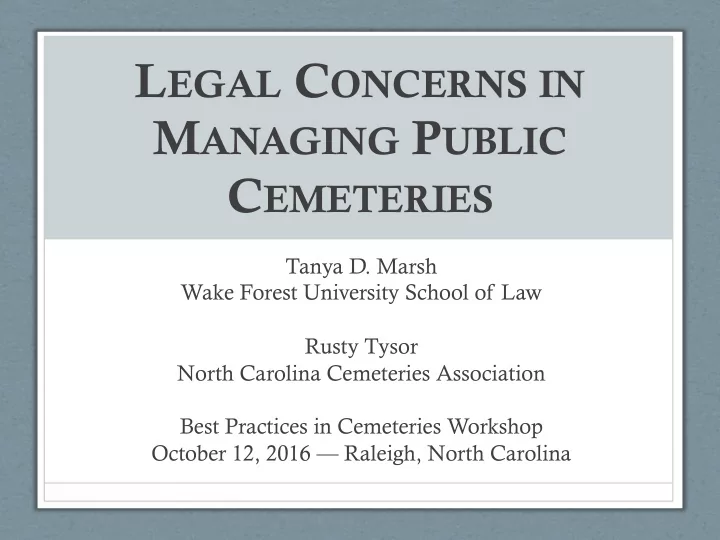

L EGAL C ONCERNS IN M ANAGING P UBLIC C EMETERIES Tanya D. Marsh Wake Forest University School of Law Rusty Tysor North Carolina Cemeteries Association Best Practices in Cemeteries Workshop October 12, 2016 — Raleigh, North Carolina
Hierarchy of Authorities in U.S. Law • Federal Constitution • Federal statutes, treaties and court rules • Federal administrative agency rules • Federal common law • State constitutions • State statutes and court rules • State administrative agency rules • State common law • Local statutes and rules
Sources of Cemetery Law in United States • Federal administrative agency rules (FTC Funeral Rule) • State statutes (Cemetery Acts, public health, criminal) • State administrative agency rules • State common law (legal and property interests in graves) • Local statutes and rules (primarily land use)
Legal & Property Rights in Burying Places Right of the dead to decent burial and undisturbed repose (legal 1. right). Right of Sepulture (attaches to remains) (legal right) 2. • Before interment, right to control human remains and determine place & manner of disposition. • After interment, right to protect human remains from desecration. Right of Interment (attaches to burial places) (property right) 3. • Before interment, right to inter remains subject to cemetery rules. • After interment, right to protect human remains and grave subject to cemetery rules. Owner of Burial Place (property right) 4.
Overview of Relevant North Carolina Law
Types of Cemeteries in North Carolina • Cemeteries owned and operated by governmental entities • Cemeteries owned and operated by cities and towns (Chapter 160A, Article 17) • Cemeteries owned and operated by the state (veteran’s cemeteries) • Cemeteries owned and operated by counties (§ 65-5) • Cemeteries owned and operated by churches (not regulated) • Cemeteries owned by persons in the business of operating a cemetery (NC Cemetery Act) • Cemeteries owned and operated by fraternal organization for at least 50 years prior to 9/1/1975 (not regulated) • Other (not regulated)
Establishment & Regulation of Municipal Cemeteries Chapter 160A, Article 17 • City has authority to establish, operate, and maintain cemeteries • City may prohibit burials within city other than at city cemeteries, licensed cemeteries, and church cemeteries • City may convey city cemetery to church cemetery or licensed cemetery • City may assume control of abandoned cemeteries • City may adopt by ordinance rules and regulations for city cemetery
Criminal Laws Protecting Graves & Cemeteries • NCGSA § 14-127.1. Graffiti vandalism • NCGSA § 14-132. Disorderly conduct in and injuries to public buildings and facilities • NCGSA § 14-144. Injuring houses, churches, fences and walls • NCGSA § 14-148. Defacing or desecrating grave sites • NCGSA § 14-149. Desecrating, plowing over or covering up graves; desecrating human remains
NCGSA § 130A-420(a) Authority to dispose of body or body parts An individual at least 18 years of age may authorize the type, place, and method of disposition of the individual's own dead body by methods in the following order: • Pursuant to a preneed funeral contract or a cremation authorization form • Pursuant to a health care power of attorney • Pursuant to a written will • Pursuant to a written statement other than a will signed by the individual and witnessed by two persons who are at least 18 years old
NCGSA § 130A-420(a1) Authority to dispose of body or body parts An individual at least 18 years of age may delegate his or her right to dispose of his or her own dead human body to any person by one of the following methods: • Any means authorized in subsection (a) of this section. • By completing United States Department of Defense Record of Emergency Data, DD Form 93
NCGSA § 130A-420(b) Authority to dispose of body or body parts If a decedent has left no written authorization for the disposal of the decedent's body as permitted under subsection (a) of this section, the following competent persons in the order listed may authorize the type, method, place, and disposition of the decedent's body: 1) The surviving spouse 2) A majority of the surviving children over 18 years of age, who can be located after reasonable efforts 3) The surviving parents 4) A majority of the surviving siblings over 18 years of age, who can be located after reasonable efforts 5) A majority of the persons in the classes of the next degrees of kinship, in descending order, who, under State law, would inherit the decedent's estate if the decedent died intestate who are at least 18 years of age and can be located after reasonable efforts 6) A person who has exhibited special care and concern for the decedent and is willing and able to make decisions about the disposition 7) In the case of indigents or any other individuals whose Linal disposition is the responsibility of the State or any of its instrumentalities, a public administrator, medical examiner, coroner, State-appointed guardian, or any other public ofLicial charged with arranging the Linal disposition of the decedent 8) In the case of individuals who have donated their bodies to science or whose death occurred in a nursing home or private institution and in which the institution is charged with making arrangements for the Linal disposition of the decedent, a representative of the institution 9) In the absence of any of the persons described in subdivisions (1) through (8) of this subsection, any person willing to assume responsibility for the disposition of the body
Frequent Points of Conflict • Disagreements between next of kin • Disagreements between holder of right of sepulture and right of interment • Disagreements between cemetery and next of kin • Fixing mistakes
Recommend
More recommend